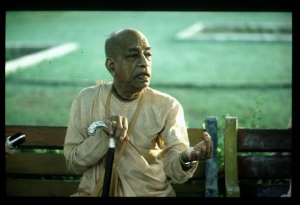SB 10.33.26-27: Difference between revisions
m (1 revision(s)) |
No edit summary |
||
| Line 1: | Line 1: | ||
{{info | {{info | ||
|speaker=King | |speaker=King Parīkṣit | ||
|listener= | |listener=Śukadeva Gosvāmī | ||
}} | }} | ||
[[Category:Srimad-Bhagavatam - Canto 10 Chapter 33]] | |||
[[Category:Bhagavatam Verses Spoken by Pariksit Maharaja - Vanisource|103326]] | |||
<div style="float:left">'''[[Srimad-Bhagavatam]] - [[SB 10|Tenth Canto]] - [[SB 10.33: The Rasa Dance|Chapter 33: The Rāsa Dance]]'''</div> | |||
<div style="float:right">[[File:Go-previous.png|link=SB 10.33.25]] '''[[SB 10.33.25]] - [[SB 10.33.28]]''' [[File:Go-next.png|link=SB 10.33.28]]</div> | |||
{{RandomImage}} | |||
{{SBnotice}} | |||
==== TEXTS 26-27 ==== | ==== TEXTS 26-27 ==== | ||
<div | <div class="verse"> | ||
śrī-parīkṣid uvāca | :śrī-parīkṣid uvāca | ||
saṁsthāpanāya dharmasya | :saṁsthāpanāya dharmasya | ||
praśamāyetarasya ca | :praśamāyetarasya ca | ||
avatīrṇo hi bhagavān | :avatīrṇo hi bhagavān | ||
aṁśena jagad-īśvaraḥ | :aṁśena jagad-īśvaraḥ | ||
sa kathaṁ dharma-setūnāṁ | |||
vaktā kartābhirakṣitā | :sa kathaṁ dharma-setūnāṁ | ||
pratīpam ācarad brahman | :vaktā kartābhirakṣitā | ||
para-dārābhimarśanam | :pratīpam ācarad brahman | ||
:para-dārābhimarśanam | |||
</div> | </div> | ||
| Line 22: | Line 28: | ||
==== SYNONYMS ==== | ==== SYNONYMS ==== | ||
<div | <div class="synonyms"> | ||
śrī-parīkṣit | ''śrī-parīkṣit uvāca''—Śrī Parīkṣit Mahārāja said; ''saṁsthāpanāya''—for the establishment; ''dharmasya''—of religious principles; ''praśamāya''—for the subduing; ''itarasya''—of the opposite; ''ca''—and; ''avatīrṇaḥ''—descended (upon this earth); ''hi''—indeed; ''bhagavān''—the Supreme Personality of Godhead; ''aṁśena''—with His plenary expansion (Śrī Balarāma); ''jagat''—of the entire universe; ''īśvaraḥ''—the Lord; ''saḥ''—He; ''katham''—how; ''dharma-setūnām''—of the restrictive codes of moral behavior; ''vaktā''—the original speaker; ''kartā''—the executor; ''abhirakṣitā''—the protector; ''pratīpam''—contrary; ''ācarat''—behaved; ''brahman''—O ''brāhmaṇa'', Śukadeva Gosvāmī; ''para''—of others; ''dāra''—the wives; ''abhimarśanam''—touching. | ||
</div> | </div> | ||
{{SBcollapse}} | |||
==== TRANSLATION ==== | ==== TRANSLATION ==== | ||
<div | <div class="translation"> | ||
Parīkṣit Mahārāja said: O brāhmaṇa, the Supreme Personality of Godhead, the Lord of the universe, has descended to this earth along with His plenary portion to destroy irreligion and reestablish religious principles. Indeed, He is the original speaker, follower and guardian of moral laws. How, then, could He have violated them by touching other men's wives? | Parīkṣit Mahārāja said: O brāhmaṇa, the Supreme Personality of Godhead, the Lord of the universe, has descended to this earth along with His plenary portion to destroy irreligion and reestablish religious principles. Indeed, He is the original speaker, follower and guardian of moral laws. How, then, could He have violated them by touching other men's wives? | ||
</div> | </div> | ||
| Line 36: | Line 42: | ||
==== PURPORT ==== | ==== PURPORT ==== | ||
<div | <div class="purport"> | ||
As Śukadeva Gosvāmī was speaking, King Parīkṣit noticed that some persons seated in the assembly on the bank of the Ganges were harboring doubt about the Lord's activities. These doubtful persons were karmīs, jñānīs and others who were not devotees of the Lord. To clear up their doubts, King Parīkṣit asks this question on their behalf. | As Śukadeva Gosvāmī was speaking, King Parīkṣit noticed that some persons seated in the assembly on the bank of the Ganges were harboring doubt about the Lord's activities. These doubtful persons were ''karmīs'', ''jñānīs'' and others who were not devotees of the Lord. To clear up their doubts, King Parīkṣit asks this question on their behalf. | ||
</div> | |||
</div> | |||
</div> | </div> | ||
__NOTOC__ | |||
<div style="float:right">[[File:Go-previous.png|link=SB 10.33.25]] '''[[SB 10.33.25]] - [[SB 10.33.28]]''' [[File:Go-next.png|link=SB 10.33.28]]</div> | |||
__NOTOC__ | |||
__NOEDITSECTION__ | |||
Revision as of 03:02, 23 May 2021

A.C. Bhaktivedanta Swami Prabhupada
Please note: The synonyms, translation and purport of this verse were composed by disciples of Śrīla Prabhupāda
TEXTS 26-27
- śrī-parīkṣid uvāca
- saṁsthāpanāya dharmasya
- praśamāyetarasya ca
- avatīrṇo hi bhagavān
- aṁśena jagad-īśvaraḥ
- sa kathaṁ dharma-setūnāṁ
- vaktā kartābhirakṣitā
- pratīpam ācarad brahman
- para-dārābhimarśanam
SYNONYMS
śrī-parīkṣit uvāca—Śrī Parīkṣit Mahārāja said; saṁsthāpanāya—for the establishment; dharmasya—of religious principles; praśamāya—for the subduing; itarasya—of the opposite; ca—and; avatīrṇaḥ—descended (upon this earth); hi—indeed; bhagavān—the Supreme Personality of Godhead; aṁśena—with His plenary expansion (Śrī Balarāma); jagat—of the entire universe; īśvaraḥ—the Lord; saḥ—He; katham—how; dharma-setūnām—of the restrictive codes of moral behavior; vaktā—the original speaker; kartā—the executor; abhirakṣitā—the protector; pratīpam—contrary; ācarat—behaved; brahman—O brāhmaṇa, Śukadeva Gosvāmī; para—of others; dāra—the wives; abhimarśanam—touching.
Translation and purport composed by disciples of Śrīla Prabhupāda
TRANSLATION
Parīkṣit Mahārāja said: O brāhmaṇa, the Supreme Personality of Godhead, the Lord of the universe, has descended to this earth along with His plenary portion to destroy irreligion and reestablish religious principles. Indeed, He is the original speaker, follower and guardian of moral laws. How, then, could He have violated them by touching other men's wives?
PURPORT
As Śukadeva Gosvāmī was speaking, King Parīkṣit noticed that some persons seated in the assembly on the bank of the Ganges were harboring doubt about the Lord's activities. These doubtful persons were karmīs, jñānīs and others who were not devotees of the Lord. To clear up their doubts, King Parīkṣit asks this question on their behalf.